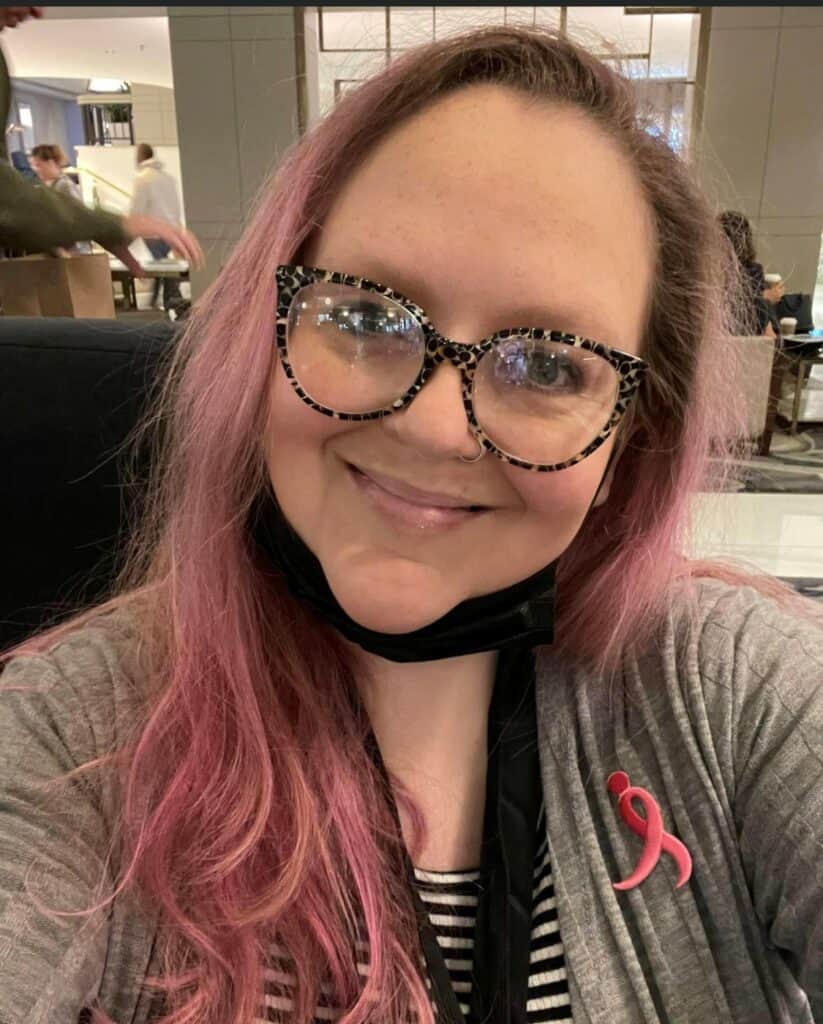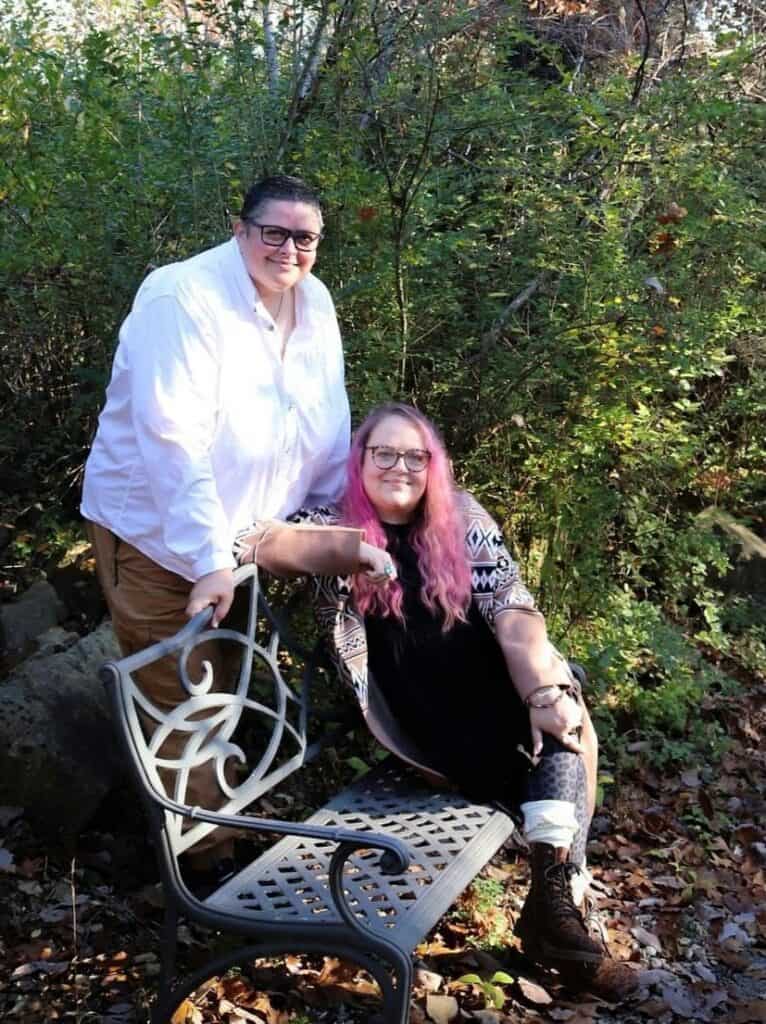
Deborah Croskrey was preparing to start in vitro fertilization treatments in 2005 when her doctor felt a lump in her breast during a routine appointment. At 30 years old and with no family history of breast cancer, Deborah wasn’t initially concerned when her doctor then ordered a diagnostic mammogram and ultrasound.
“During the mammogram, the tech stopped talking to me and ended the niceties pretty quickly,” Deborah said. “The same thing happened in the ultrasound. When the tech called for the radiological surgeon, he said he was ordering a biopsy and told me to call my partner, Alex, and have them come meet us so that I had someone supportive with me. It all went downhill from there.”
Deborah was diagnosed with de novo metastatic breast cancer (MBC) that had spread to her lungs and bones.
“It was the most traumatic way of ever learning you have breast cancer, but I’m grateful the radiological surgeon didn’t mince words. He likely saved my life being as aggressive as he was that day.”
“It was the most traumatic way of ever learning you have breast cancer, but I’m grateful the radiological surgeon didn’t mince words,” Deborah said. “He likely saved my life being as aggressive as he was that day. Within one week, I was meeting with a surgeon. Eight days later, I was meeting with an oncologist, and life changed from that point on. It went from ‘we want to have children’ to ‘three years is the best prognosis we can give you.’”
Deborah started an aggressive treatment plan, taking Adriamycin and Cytoxan intravenously for chemotherapy every two weeks, followed by Taxol. She then underwent 30 rounds of radiation therapy and ultimately had a total hysterectomy.
“My oncologist told me I needed to have a hysterectomy as part of my treatment plan,” Deborah said. “I told her, ‘But after all of this, I’m going to have kids.’ She said, ‘You will not be having children. If you were to have children, it would be the most selfish thing you could do because you’re not going to be alive to see them grow up. That was incredibly difficult to hear.”
Complementary and Integrative Therapies
While Deborah had originally been diagnosed as HER2-negative, estrogen-receptor positive, her cancer started shifting to triple positive (estrogen-receptor positive, progesterone receptor positive and HER2-positive) after her hysterectomy. Her oncologist prescribed Herceptin and Faslodex as new medications in her treatment plan. She utilized complementary and integrative therapies like meditation and visualization to help with stress management and ease her anxiety.
“My oncologist was also running a clinical trial at the University of Kansas, giving MBC patients high doses of Vitamin D,” Deborah said. “She recommended that I enroll. I started taking 50,000 IUs of Vitamin D every day for six months. Each scan got progressively better and better. She said, ‘You should be stable, but you shouldn’t actually keep getting better and better like this.’ I just kept moving on.”
When Deborah’s partner, Alex, started having health issues, they moved to Branson, Missouri, to be closer to Alex’s family. Her new oncologist at Oncology & Hematology Associates in Springfield, Missouri, added Zometa to Deborah’s treatment plan.
“I was getting regular heart scans, and we were trying to protect my heart from being damaged from the medications,” Deborah said. “We stayed the course until 2017 when I had a heart attack. I didn’t realize I was having a heart attack when it happened. Instead, I just thought I was sick and felt extremely exhausted. It wasn’t until I watched Rosie O’Donnell talking about her heart attack on TV and explaining similar symptoms that it occurred to me.”
Deborah scheduled an appointment with her primary care doctor the next day, who confirmed she had experienced a massive heart attack. An angiogram (X-ray of blood vessels) showed scar tissue on her heart caused by the radiation therapy, which had shrunk and hardened her arteries. She had a stint placed in her heart the same day.
“Because I was stable and my heart had taken a major hit, my oncologist recommended taking me off all treatment and monitoring me,” Deborah said. “He explained, ‘If you did have a recurrence, it would be really dangerous to put you on more aggressive treatment because of your heart situation.’ He wanted to back off and give my heart a chance to heal and recuperate.”
Complications from Treatments

Deborah has been off treatment entirely since 2017 and has now been living with MBC for 18 years. She is committed to living a healthy lifestyle and pursuing wellness through complementary and integrative therapies as she continues to experience complications from previous treatments, such as osteonecrosis of the jaw, a serious jawbone disorder.
“My teeth have taken a hit,” Deborah aid. “Dental issues are one of the platforms I am very passionate about because they need to be treated as a medical issue for cancer patients, not simply a dental issue. But, in my experience, dentists don’t like to treat you if you have osteonecrosis. It can take months or even years to get referred to the right dentist.”
Deborah also advocates for more awareness about the financial toxicity of dental issues for cancer patients. She previously tried to pursue lower-cost dental work at a local dental school, which was equally apprehensive to treat her due to her osteonecrosis. Additionally, the wait list for cancer patients to get a simple consultation – much less schedule an appointment for treatment – can take months.
“I see so many people with breast cancer who are going through the same dental issues,” Deborah said. “Some people don’t even have dental coverage, so they just let their teeth fall out. It’s so sad to watch. I am lucky to have long-term disability coverage through my former employer, but I still have to be very careful about how I plan my dental work each year due to the high costs.”
Deborah also has diabetes, long-term neuropathy and thyroid issues as a result of her MBC treatments. While she faces many health challenges each day, she said her partner of 26 years, Alex, serves as an immense source of strength and support and has stood by Deborah despite endless challenges, especially financially.
“About a year after my diagnosis, I made the decision that I could spend my time being mad about it, or I could make the most of it. I always said from the beginning that I want to get to the end of my life and know that I did everything I could to enjoy myself and enjoy life.”
“We had a lot of financial strain during treatment,” Deborah said. “I was previously denied long-term disability benefits for six months while I was in active treatment. We took a big hit financially during that time. Once my disability was resolved, it was too late to keep our house. We lost it. We also lost two cars because I had to pick paying for treatment instead of paying for the cars. I was on Arimidex at the time and had to pay $1,200 per month out of pocket.”
Alex worked 18-hour days at their private security job to pay the bills while Deborah stayed home. Without internet at home, Deborah felt isolated in her early days of living with MBC and craved support from others who were living with the disease and experiencing similar challenges.
“About a year after my diagnosis, I made the decision that I could spend my time being mad about it, or I could make the most of it,” Deborah said. “I always said from the beginning that I want to get to the end of my life and know that I did everything I could to enjoy myself and enjoy life.”
Deborah continues to take larger doses of Vitamin D after she experienced positive results in the clinical trial at the University of Kansas.
“I find taking Vitamin D to be helpful in managing my depression, especially seasonal depression. That is the only thing I take now besides my heart and diabetes medications,” Deborah said.
“I’ve always tried to maintain a positive outlook,” she continued. “Alex has struggled with some mental illness since my diagnosis. I try to have a positive outlook for them so that it doesn’t exacerbate their mental illness diagnoses. We give and take. I help handle those diagnoses, and Alex does their best to handle and help my diagnoses.”
Becoming an MBC Advocate
Deborah also turned to creating art as a form of therapy and has an active TikTok account where she gives tutorials. She has connected to numerous online friends through social media and online support groups for those living with MBC. She currently runs a Facebook group for “MBC outliers” who have lived with the disease for more than five years.
“I never thought I would find a little online family,” Deborah said. “We text each other throughout the day. It’s just been a super amount of support, and it’s helped bring me into a more positive light. I’m not constantly hyper-focused on my health issues when I have them to converse with.”
“The people that I have lost to this disease found advocacy as a helpful way to get through their diagnosis. I’m carrying on what they started. I’m an extension of them.”
“The only downside is the people that I meet, I become attached to,” Deborah continued. “A lot of them end up passing, so I lose a lot of friends, and that’s hard to watch.”
She has also met numerous friends as an MBC patient advocate, which ultimately connected her to Susan G. Komen. She first participated in Congressional visits in 2016 alongside Victoria Wolodzko Smart, Komen’s Senior VP of Mission, and is dedicated to raising more awareness of the challenges of those living with MBC face each day.
“I didn’t plan to become an advocate,” Deborah explained. “I am very much an introvert. I had previously been involved on a local level in writing to our state to get October 13 recognized as Metastatic Breast Cancer Awareness Day in Missouri.”
Deborah plans to continue participating in more Congressional visits as her finances allow her to travel. She also uses her presence on social media to share relevant MBC information to her followers to increase awareness for the disease.
“The people that I have lost to this disease found advocacy as a helpful way to get through their diagnosis,” Deborah said. “I’m carrying on what they started. I’m an extension of them. When I go to Congressional visits, their names are written on my heart. I am there to make sure their voices continue to go on. I hope that when I’m gone, someone will do that for me.”


